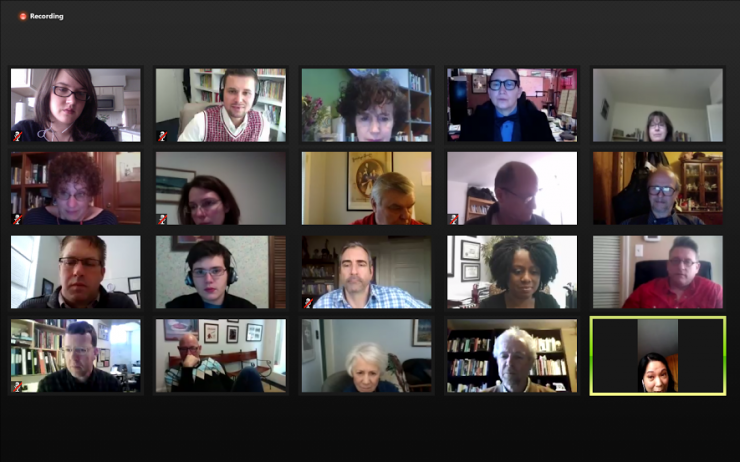The Art of Never Giving Up

This piece continues a partnership between HowlRound and the League of Professional Theatre Women (LPTW). For many years, LPTW has been publishing an annual magazine, Women in Theatre (WIT). This year they’ve expanded the magazine to include an online format and are collaborating with HowlRound to provide content covering an array of issues and perspectives within the theatre, all highlighting women’s voices. The co-editors for this project are Eliza Bent and Alexis Clements. Look for bi-monthly content from WIT on HowlRound ranging from interviews to articles and blog responses. Find all WIT content here.
Last week was one of those weeks where a handful of organizations decided to send out their rejections on the same day, a sort of kick 'er while she's down conspiracy. I'm fairly adept at bouncing back from the steady trickle of gracious declinations or outright refusals, fueling up on the intermittent yeses or waitlistings or finalings. But lately, more frequently than ever before, I have days where I think: might it be better if I turn my focus elsewhere?
Playwright Gwydion Suilebhan recently published an article about the dismal reality of playwriting statistics. According to him, there are upwards of 10,000 playwrights writing in the United States. If each of them is producing one new play a year, only ten percent of them will have a world premiere production, leaving the remaining 90 percent to languish in obscurity. “Changing [these numbers], I believe, should be among the highest priorities of playwrights everywhere,” he says. “For our own good, and for the good of our fellow artists.”
Of course, the fact remains that women writers face even harsher realities: by every estimation, plays written by female playwrights make up about 17 percent of all productions in this country. And we seem to be caught in somewhat of a Catch-22. At the recent Summit in Washington, D.C., artistic director Ryan Rilette made the claim that there simply aren’t enough plays written by women “in the pipeline.” Director and dramaturge Elissa Goetschius (who also happens to keep a very comprehensive list of female directors on her personal website) summed it up on the 2amt Blog: “[Rilette] defined the pipeline as a channel flowing from New York and London to the regional theatres, meaning that plays that met success in either of those locations can be relied on to perform well at the box office. His argument was essentially a paradox: There aren’t enough plays by women being produced, so I can’t produce plays by women.”
So how do we, as female artists, persevere day to day in an industry that’s rife with rejection?
Despite my deep and abiding love for the theatre, and all of the time, energy and money I sunk into that passion, I still think about giving it all up.
I'm a playwright, novelist, short story writer, freelance writer—being a writer is such a big part of who I am and how I self-identify that I know I could never give up writing. But theatre has always been my first love, and I pursued it aggressively in academia, earning an MFA in playwriting and all the student loan debt that goes with it. Despite my deep and abiding love for the theatre, and all of the time, energy and money I sunk into that passion, I still think about giving it all up. And I know I’m not the only one considering it.
A few days ago I posted the following query on Facebook: Theater Folk—Have you ever gotten to a point where you [think], "I don't know if I want to do theater anymore”?
The response I got from my network, comprised largely of fellow theatre artists at various points in their careers, was as follows:
I think about this all the time.
Yes.
Yes. Constantly.
Every day.
Yes. I struggle with this. But what else would I do?
I was immediately comforted by the knowledge that I wasn’t alone in my frustrations, but also perturbed by the fact that it was something I had heard from people who, from the outside, seemed to be very successful in the theatre world. It seemed that people at all levels of their careers experienced this kind of pressure and frustration, though I noticed that the vast majority of my respondents were women. Pulitzer-prize winning playwright Marsha Norman wrote in her article Not There Yet: “The U.S. Department of Labor considers any profession with less than 25 percent female employment, like being a machinist or firefighter, to be ‘untraditional’ for women. Using the 2008 numbers, that makes playwriting, directing, set design, lighting design, sound design, choreography, composing and lyric writing all untraditional occupations for women. That's a disaster if you're a woman writer, or even if you just think of yourself as a fair person.”
Armed with this information, I reached out to a few colleagues at the League of Professional Theatre Women, and heard many of the same concerns surrounding opportunity and discrimination echoed in their stories.
LPTW Member Mari Lyn Henry, casting director and co-author of How To Be A Working Actor, said of her long and storied time in the business, “If I had known at the beginning of my career that there would be bumps in the road, hurdles to jump, bullets to dodge, deception, double standards, hypocrisy, and all of the insecurity that comes with being creative, I might not have tried so hard to stay on track.” So how can we then stay on track, and continue to push ourselves forward in this often unrewarding career track?
The Dramatists Guild attempted an answer when it recently held an online seminar—or “huddle”—that was part of a series of similar digital events, entitled “How Do You Measure Success?” The description of the discussion was as follows:
Executive Director of Creative Affairs Gary Garrison will chat with members across the country about what can keep us writing when faced with so many emotional obstacles in our careers. How do writers, who can struggle for years with few productions, define success for themselves? What can we do to keep fighting the good fight when our careers feel so overwhelmingly bleak at times? If you've ever thought "Why should I keep writing? For what? For who?," this session is for you.
And it couldn’t have come at a better time for me, when I had just enough rejection letters to wallpaper most of the house. In the discussion, playwrights from across the country came together to talk about how they stick it out in a business as exhausting as show business.
Gary Garrison advised us to get very specific about success, setting realistic goals to promote sustainability.
We began the “huddle” by trying to define what success was to each of us. Participants offered up things like completing scripts, or working with the right people, or seeing a play reach a full production as markers of success. Gary Garrison advised us to get very specific about success, setting realistic goals to promote sustainability. He said that it was as important to celebrate reaching those goals as it was to reach them at all, to take the time to appreciate the completion of a script, or the gathering of the perfect collaborative team, or even something as simple as reaching your daily word count goal. “Success,” Garrison said, “is as simple as picking a place you want to go and walking toward it.”
Successful artists are a fortunate few who get to make a living doing something wonderful, something they are deeply passionate about. But that doesn't mean that it isn't a job and that it shouldn't be approached as one. Artists tend to be notoriously poor business people, putting their great work before such necessary practical considerations as building an appropriate web presence, managing their tax deductions, being diligent about bookkeeping, and protecting their intellectual property. The participants in the huddle all agreed that longevity in the theatre world needed to include expanding one’s skill set to include the ability to handle these kinds of practicalities.
And, perhaps, expanding one’s skill set to include wearing the hat of producer or press agent, development executive or designer in service of self-producing. In graduate school, I had the good fortune to study under Chuck Mee and Anne Bogart, who both insisted that it was a mistake to wait for the gatekeepers to throw the doors wide for you. “That might not happen,” they said. “Don’t wait for permission.” With so many other artists going the same route, it’s important not to forget the wealth of skills you have in your network. Can you build a website? Hang and focus lights? Offer your skills in exchange for someone else’s, or see if you can shadow them so you can learn to do it yourself.
Another major discussion point for the group was about how to manage our expectations. Perhaps this is something unique to Americans, or unique to my generation, but being raised with the promise that hard work plus talent equals success breeds intense frustration when, at the end of a hard day at work, another rejection rolls in. It was suggested that these feelings can be tempered by finding community, attending workshops and conferences, building writing groups and using the vast array of technology available to us to set up meetings and support groups (like the huddle itself). In my opinion, bonding with other members of your community is the best way to stave off the rejection blues. Even though some of my closest friends, peers and collaborators are scattered across the country, we have found the time to meet in Google Hangouts twice a month to offer critique and support. In this way, we maintain the strong bonds that keep me from drifting alone in this business. They help me through rejections, and they celebrate with me when I reach my goals.
Of course, every time a goal is reached, the standard by which success is measured must be re-calibrated. And adopting that type of flexibility is, I think, what can allow us to stick it out in the theatre through times of instability. Ultimately, however, what keeps us here is the love of the work. “The gift to me is the collaboration and exploration involved in creating art between playwright/director; actor/director; designer/director; audience/director; the giving and receiving/sharing and experiencing that makes all the hardships worthwhile. The magic and passion never leave if you have trust, truth, bravery, compassion and vision,” said Lorca Peress, director and LPTW co-president.
I asked performer and playwright Richarda Abrams if she had ever considered giving up on the theatre. And out of everyone I asked, she was the only one who said no. “I have never had a thought of giving up on anything,” she said. “[The theatre] is a continued study, a passion of discovering the many possibilities of being.” It was encouraging, because she’s right: the theatre is living art. It’s constantly evolving, giving us the opportunity to evolve with it.
Because tomorrow, I might get another “yes” and another after that, enough for me to tape over all the rejection letters. But even if I don’t, the theatre is where I choose to tell my stories. So I keep working; I enjoy the work, I remain diligent, and maybe I look at the rejection streak in a new light. Maybe it’s an opportunity to walk out of the black box and into the sunlight. Because what kind of stories would I bring into the theatre if I spent all of my time in it?
***
Christine Evans, Elaine Romero, and Rachel Jendrzejewski created an evolving, open-source list of female and trans playwrights to which anyone can add herself. The LPTW teamed up to support them by creating this button that can be shared on any site with a link back to this list. With it we proudly declare that WE EXIST.
Click on the button to go to the list:
Click here to download the button image for your own website.
















Comments
The article is just the start of the conversation—we want to know what you think about this subject, too! HowlRound is a space for knowledge-sharing, and we welcome spirited, thoughtful, and on-topic dialogue. Find our full comments policy here
Great post!
I agree with Bob Jude Ferrante about the DIY option. The tides are turning from the older traditional ways of gate-keepers and such. Theatre artists - women and men - are slowly coming around to what artists in other domains are already catching onto... to be really active one has to be proactive. This means a more entreprenuerial approach to being an artist.
As an instigator (as opposed to an interpretive artist) playwrights are in a great position to literally "make theatre" for themselves, to take responcibility for creating the expression of an idea and then seeing it through as it gets out to a wider audience (as opposed to handing it over for someone to do for you).
The argument can always be made that one chooses to specialize. "But I'm a playwright. What do I know about producing, directing, and so on?" To this I say, widen your definition of playwright.
And it depends on your goals. Do you write plays to be known as a playwright? To make money (I know, stop laughing)? To express an idea unique to you about how we live in the world?
This DIY approach, of course, is not the only way to move into the future, but it seems to be one that is gaining traction.
Yes, spring with its flowering trees and proliferating rejection letters can be a tough time for playwrights. When I am at my most down and discouraged, I try to think about what I can control rather than parse the decisions of theaters and development programs. For me that means, how can I become a better playwright? Last year, I signed up with not one but two dramaturgs ( I didn't tell them about each other) and received feedback on a play that was both rigorous and inspiring. One year later, those questions and suggestions are still ringing in my ears. Best of all, the experience made me feel, again, like a playwright. Oh, and the play got a lot stronger
This is a great piece! Thank you for so honestly articulating something we all deal with. I've been giving thought lately to how we shift our concept of 'rejection' - which effectively puts our sense of ourself (our talent, our gifts) into someone else's hands. As a queer woman, I realized a long time ago that asking for someone to 'accept' me - who I am, what I have to say, my right to be here and be me - gives them power. So when I put my plays out in the world now, I try to think of it as an action on a continuum of the process, and let go of the results. I might not get that particular opportunity or award or production, but my sense of myself as a writer isn't tied up in the outcome.
I was just feeling discouraged last night, not ready to give up but seriously considering how I needed to step up my game. I'm only at the beginning of my career so it's important to keep hearing that we female playwrights are struggling like this, but not giving up. Together.
Your biggest competition isn't living male writers.
It's dead ones.
Plays in the public domain make up close to half of today's productions.
From the remaining 50 percent, a good portion of the work being done is re-mounting established works. So if you're writing a new play, there just aren't many places to go to see it done. DIY is the way of the world now.
The best way for me to not give up is to help someone who is struggling. The material scarcity that goes along with being an artist can create fear and ego. The best way for me to consider the possibility for abundance is to forget myself and be compassionate.